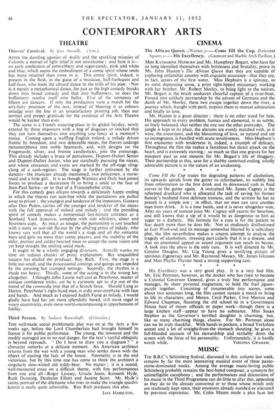CONTEMPORARY ARTS
THEATRE
Thieves' Carnival. By Jean Anouilh. (Arts.)
Arrest the dazzling agonies of Ardele and the sparkling miseries of Colombe a morsel of light relief is not unwelcome ; and here it is— an early confection of cobwebbery and sugar-candy, pink and white and blue, which seems the embodiment of a comic spirit whose smile has more mischief than irony in it. This comic spirit, indeed, is present in the flesh, in the guise of a musician, half-harlequin and half-faun, who leads the absurd dance tb the trills of his pipe. 'Nor is it merely a metaphorical dance, for just as the high comedy breaks down into broad comedy and that into buffoonery, so does the buffoonery resolve itself into ballet. Five of the company of fifteen are dancers. If only the production were a match for the airy-fairy precision of the text, instead of blurring it as colours smudge over the line in an unsatisfactory printing job, then our normal and proper gratitude for the existence of the Arts Theatre would be keener than ever.
The scene is a French watering-place in its gilded heyday, newly entered by three impostors with a bag of disguises so "stocked that they can turn themselves into anything you- fancy at a moment's notice. Coming upon a waffling English milord, a milady driven frantic by boredom, and two delectable nieces, the thieves undergo metamorphosis into noble Spaniards, and, with designs on the Fragonards, silver, and bronze candlesticks, join the entourage. This already includes a brace of pantaloons, Dupont-Dufort Senior and Dupont-Dufort Junior, who are starchedly pursuing the nieces, and whose entrances and exists are marked by the off-stage cling- clang of a cash-register. The stage is further enlivened by the dancers—the musician already mentioned, two policemen, a nurse- maid and a little girl. It is as though Watteau and Dufy had joined forces to produce a decoration fit to bring a smile to the face of Jean-Paul Sartre—or to that of a Francophobic critic.
For this comedy goes allegro towards a deliciously happy ending in which the thieves run scot-free while the pantaloons are pulled away to prison ; the youngest and tenderest of the impostors, Gustave alias Don Pedro, carries off the younger and tenderer of the nieces with the full approval of milord and milady ; and the presiding spirit of comedy makes a nonsensical last-minute entrance as a Scotland Yard detective, complete with side whiskers, ulster and Inverness cape. As sweet as nougat, the pantomime is just touched with a nutty or noir-ish flavour by the abiding ennui of milady, who knows very well that all the world's a stage and all the romantic boys and girls no more than comic players, and the inability of the elder, prettier and colder-hearted niece to accept the same vision and yet keep straight the smiling social mask.
It ought to be a wholly engaging diversion. Anouilh wastes no time on tedious chunks of prosy explanation. But unqualified success has eluded the producer, Roy Rich. First, the stage is a little too small, and the processional comings and goings are impeded by the amusing but cramped settings. Secondly, the rhythm is a shade too heavy. Thirdly, some of the acting is in the wrong key altogether. I thought John Laurie well cast as Peterbono, master of antique confidence tricks, yet he is curiously apt to sl:p out of the mood of the commedia into that of a Scotch farce. Harold Lang as Hector, Peterbono's right-hand man, is sadly over-emphatic with face and hands. And much as I enjoyed Judith Furse as milady. I would gladly have had her yet more splendidly bored, still more regal in weary eccentricity, even more world-encompassing in apprehension of futility.


































 Previous page
Previous page